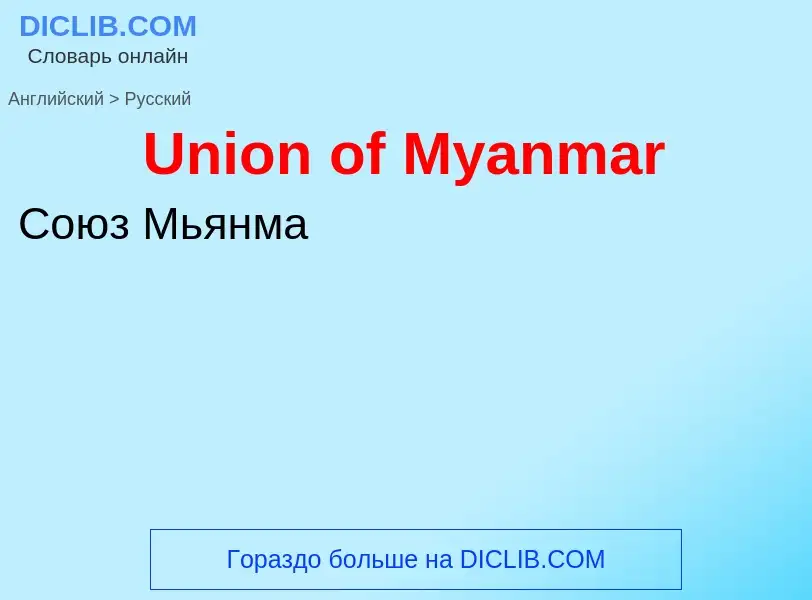Μετάφραση και ανάλυση λέξεων από την τεχνητή νοημοσύνη ChatGPT
Σε αυτήν τη σελίδα μπορείτε να λάβετε μια λεπτομερή ανάλυση μιας λέξης ή μιας φράσης, η οποία δημιουργήθηκε χρησιμοποιώντας το ChatGPT, την καλύτερη τεχνολογία τεχνητής νοημοσύνης μέχρι σήμερα:
- πώς χρησιμοποιείται η λέξη
- συχνότητα χρήσης
- χρησιμοποιείται πιο συχνά στον προφορικό ή γραπτό λόγο
- επιλογές μετάφρασης λέξεων
- παραδείγματα χρήσης (πολλές φράσεις με μετάφραση)
- ετυμολογία
Union of Myanmar - translation to ρωσικά
Ορισμός
Βικιπαίδεια
The State Peace and Development Council (Burmese: နိုင်ငံတော် အေးချမ်းသာယာရေး နှင့် ဖွံ့ဖြိုးရေး ကောင်စီ [nàɪɰ̃ŋàɰ̃dɔ̀ ʔédʑáɰ̃θàjajé n̥ḭɰ̃ pʰʊ̰ɰ̃bjó jé kaʊ̀ɰ̃sì]; abbreviated SPDC or နအဖ, [na̰ʔa̰pʰa̰]) was the official name of the military government of Burma (Myanmar) which, in 1997, succeeded the State Law and Order Restoration Council (Burmese: နိုင်ငံတော်ငြိမ်ဝပ်ပိပြားမှုတည်ဆောက်ရေးအဖွဲ့) that seized power under the rule of Saw Maung in 1988. On 30 March 2011, Senior General and Council Chairman Than Shwe signed a decree that officially dissolved the council.
From 1988 to 1997, the junta was known as the State Law and Order Restoration Council (Burmese: နိုင်ငံတော် ငြိမ်ဝပ်ပိပြားမှု တည်ဆောက်ရေးအဖွဲ့; abbreviated SLORC or နဝတ), which had succeeded the Pyithu Hluttaw as a legislature and the Council of State as a ruling council, after dissolving the State organs of the Socialist Republic of the Union of Burma. In 1997, SLORC was abolished and reconstituted as the State Peace and Development Council (SPDC). The powerful regional military commanders, who were members of SLORC, were promoted to new positions and transferred to the capital of Rangoon (now Yangon). The new regional military commanders were not included in the membership of the SPDC.
The SPDC consisted of eleven senior military officers. The members of the junta wielded a great deal more power than the cabinet ministers, who were either more-junior military officers or civilians. The exception was the Defence Ministry portfolio, which was in the hands of junta leader Than Shwe himself. On 15 September 1993, it established the Union Solidarity and Development Association which was replaced by Union Solidarity and Development Party on 29 March 2010 in time for the elections.
Although the regime retreated from the totalitarian Burmese Way to Socialism of the BSPP when it took power in 1988, the regime was widely accused of human rights abuses. It rejected the 1990 election results and kept Aung San Suu Kyi under house arrest until her release on 13 November 2010. The way the junta handled Cyclone Nargis was also internationally criticised. The council was officially dissolved on 30 March 2011, with the inauguration of the newly elected government, led by its former member and Prime Minister, President Thein Sein.

![SPDC members greet Thai PM Abhisit Vejjajiva in an October 2010 visit to [[Naypyidaw]]. SPDC members greet Thai PM Abhisit Vejjajiva in an October 2010 visit to [[Naypyidaw]].](https://commons.wikimedia.org/wiki/Special:FilePath/Burmese SPDC members greet Abhisit Vejjajiva.jpg?width=200)

![SPDC members with Thai delegation in an October 2010 visit to [[Naypyidaw]]. SPDC members with Thai delegation in an October 2010 visit to [[Naypyidaw]].](https://commons.wikimedia.org/wiki/Special:FilePath/Thai delegation with Burmese SPDC.jpg?width=200)

